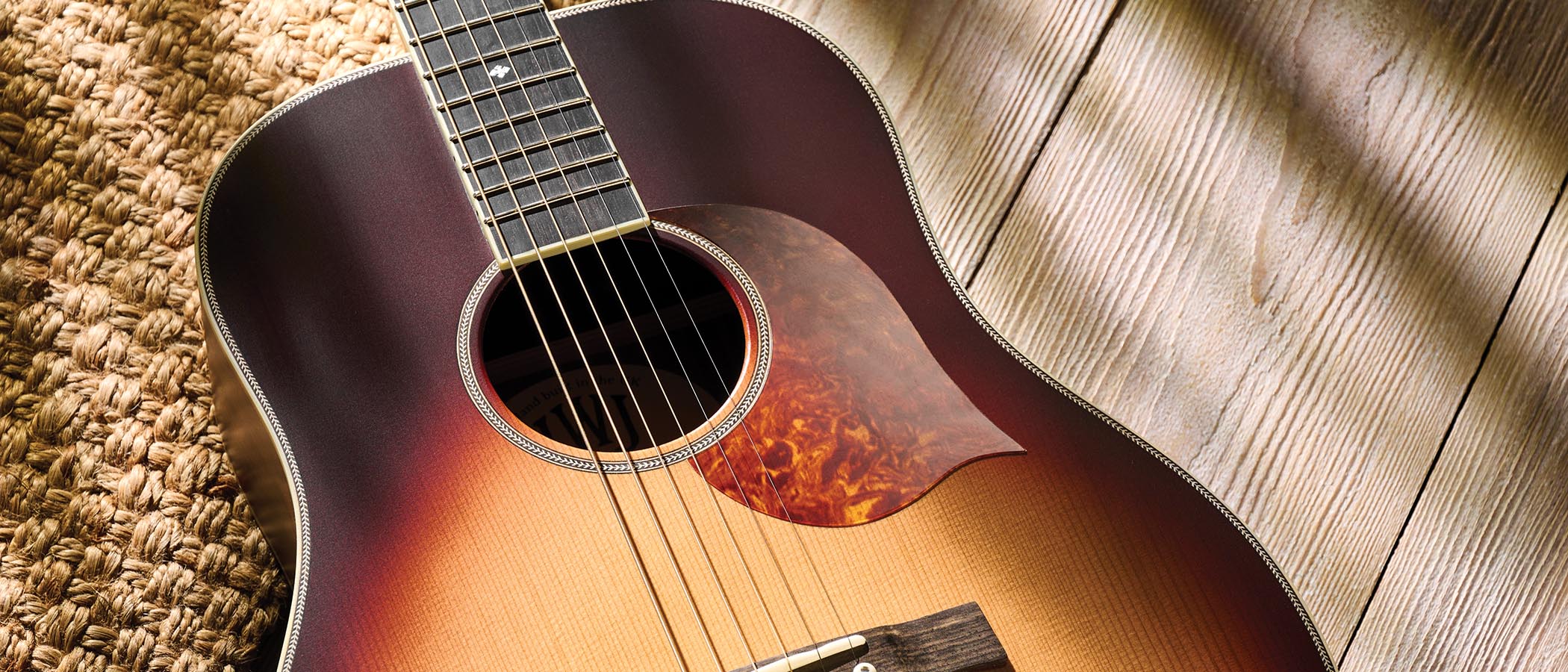Metallica’s Kirk Hammett and Gibson’s Cesar Gueikian share the story behind Greeny’s ‘59 Les Paul sibling
We all know the story of Greeny, the ‘burst owned by Peter Green, Gary Moore and now Hammett. But there is another, and it resides in the Gibson Brand President's personal collection…

All the latest guitar news, interviews, lessons, reviews, deals and more, direct to your inbox!
You are now subscribed
Your newsletter sign-up was successful
There are few, if any, electric guitars as coveted as the sunburst 1959 Gibson Les Paul Standard. And the ’59 burst known as Greeny – made famous by Fleetwood Mac legend Peter Green, later played by Irish blues-rock great Gary Moore and, since 2014, owned by Metallica’s Kirk Hammett, who has made it a staple of his work with Metallica – is one of the crown jewels of what is already a beloved model.
With its trio of esteemed owners, heavily weathered appearance (and backwards-installed neck pickup) and coveted out-of-phase middle-position tone, Greeny is, no doubt, one-of-a-kind.
“I’ve always thought of Greeny as an anomaly, just as a result of the way it looks and sounds and everything it’s been through,” Kirk Hammett says. “It’s a unique, solitary instrument.”
Indeed it is. And yet, the guitar no longer stands entirely alone: Greeny, apparently, has a sibling. And that sibling belongs to Gibson Brand President Cesar Gueikian. “We realized the two guitars have sequential serial numbers,” Gueikian says, “and our minds were blown.”

Bizarrely, Hammett and Gueikian uncovered this fact together, and by pure happenstance. “Cesar’s my bro, and we’re constantly talking about guitars,” Hammett explains. “One day over the summer he called me up and said, ‘I just got an amazing Les Paul – it’s in The Beauty of the ’Burst book.’
“I asked him for the serial number, and he read it off. And as I was reaching for my copy of The Beauty of the ’Burst to look it up, he said, ‘Wait a second – what’s Greeny’s serial number?’ So I took a picture of it and texted it to him. He looks at it and he goes, ‘Oh my god – it’s within four serial numbers of Greeny. This is amazing!’”
Cesar’s my bro, and we’re constantly talking about guitars
Kirk Hammett
Gueikian’s Les Paul, which he and Hammett christened Gemini (the symbol for “twin”), is serial number 9 2204, while Greeny is 9 2208. But here’s the kicker: no other guitars were produced in between them.
All the latest guitar news, interviews, lessons, reviews, deals and more, direct to your inbox!
“I got in touch with [Gibson Head of Product Development] Mat Koehler and the rest of the team, and we figured out that the numbers in the middle are only Skylark amps,” Gueikian says. “So the guitars are sequential twins in terms of being Les Pauls and ’bursts.”
Which means, Gueikian continues, that not only were the two Les Pauls constructed at the same time, but they were also likely fashioned from the same piece of wood. “Our hypothesis is that they were probably cut from the same maple billet, because the flame patterns are very similar – slightly off – and the mineral streaks are almost identical in the way that they run vertically,” he says.
Once Gueikian and Hammett came to the realization that Gemini is something of an older brother to Greeny, the next step was obvious. “We immediately said, ‘When are we getting the guitars together?’” Gueikian says.
Not long after, Gueikian and Hammett met up in Northern California for a jam session. Recalls Hammett, “I picked up Cesar’s guitar and played [Gary Moore’s] Still Got the Blues, because it’s the greatest song to play for that syrupy Les Paul neck tone. And it sounded dead-on like Greeny.”
Our hypothesis is that they were probably cut from the same maple billet, because the flame patterns are very similar – slightly off – and the mineral streaks are almost identical
Cesar Gueikian
Looks-wise, Gueikian continues, “Both guitars are pretty faded. The difference is Greeny has been played so much, from Peter Green to Gary Moore and now to Kirk, who uses it almost every night he’s out with Metallica, that the level of fading on that guitar is extreme, where you’re now down to the base coat. That’s why it looks way more ‘lemon,’ compared to the honey tones of mine.”
Delving deeper into the tone, Hammett says, “Greeny’s neck has been broken twice, and so you can actually hear the repairs in its sound. Or at least I imagine I can. Whereas with Cesar’s guitar, the neck hasn’t been broken, so it sounds less ‘unadulterated.’ There’s a purity of wood tone that Greeny does not have.”

The result? “Gemini was not out of phase in the middle position,” Hammett reveals. “And so we concluded that, yes, Greeny’s out-of-phase sound was the result of an aftermarket modification. That was such a cool thing to figure out.”
He continues, “So we’ve been able to learn more about Greeny through Cesar’s guitar, and I never thought that would happen. Because we didn’t think there would be a guitar so close to Greeny in production. And who knows? There might be a guitar after Greeny that has the exact same specs, too.”
Greeny will be a part of the collaboration
Cesar Gueikian
Whether or not that proves to be the case, the discovery of Gemini is hardly the end of the Greeny story. Gibson recently announced a partnership with Hammett that will see the two join forces on new signature Gibson and Epiphone models (among them, it’s been rumored, a recreation of Hammett’s famed black 1979 Flying V). As for whether Greeny will factor into their future plans together? “Yes,” Gueikian confirms. “Greeny will be a part of the collaboration.”
“We’ve had extensive discussions,” Hammett adds. “Because I don’t ever want to be an elitist with Greeny. With music and guitar, it’s all about the power of inspiration. And I know that guitar is so inspiring for people. And now thanks to Gemini, we know more than we did before about Greeny. They’re like two peas in a pod. It’s crazy.”
Rich is the co-author of the best-selling Nöthin' But a Good Time: The Uncensored History of the '80s Hard Rock Explosion. He is also a recording and performing musician, and a former editor of Guitar World magazine and executive editor of Guitar Aficionado magazine. He has authored several additional books, among them Kurt Cobain: Montage of Heck, the companion to the documentary of the same name.

